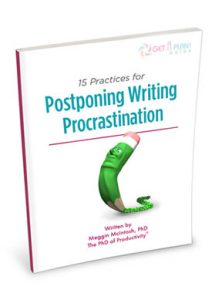Techniques for Writing Productively by Meggin McIntosh, PhD
 Having techniques for writing sounds so respectable – and it is! Here are ten techniques to enhance your writing productivity.
Having techniques for writing sounds so respectable – and it is! Here are ten techniques to enhance your writing productivity.
-
Sit outside with a pad of paper and a pen, especially when there is wind. Why that works, I can’t tell you. But it does. Getting fresh air – and really breathing it in INSPIRES you and helps you to be creative, get unstuck, get your writing done with more speed, and/or take your writing to new places.
-
Put yourself in the most positive space possible – both mentally and physically. I have observed people in their offices that have absolutely dreadful workspaces set up and then they wonder why they can’t get any work done (including writing). Likewise, if we are in a crazy mental space, our writing is hampered. Both physically and mentally, you know what your positive spaces look and feel like. I exhort you: Get thee to those places and write.
-
Write no matter what. You breathe no matter what. You go to the bathroom no matter what. You eat no matter what. You sleep no matter what. You grow older no matter what. Write no matter what. It’s natural.
-
Write as a reward. We use other things we love as rewards…why not hold out an opportunity to write as a reward? Choose a special project or some other aspect of your writing – and treat yourself by making time to do that writing. Believe me…you will begin to look forward to your writing. It’s cool how this works.
-
Read about writing. Many writers write eloquently and inspiringly about writing. Runners read about running. Gardeners read about gardening. Teachers read about teaching. Why shouldn’t you read about writing?
-
Take classes about writing. Regardless of how much you have written or how successful you have been in your writing career, you don’t know everything there is to know about writing. Real writers know this. Take a class and learn more.
-
Have a log that is just for you. You can record how many words you’ve written each day, how many consecutive days you’ve written without fail, what your current writing passions are, what your next project will be, what you’ve learned each time you write, new words you’ve learned, or what to experiment with in your writing…there is no limit to the possibilities. Mine your log for gems.
-
Keep a list of writing projects that are waiting in the wings. Whether you keep that as part of your log (see the previous technique) or keep your list in a separate place, make sure to jot down any and all ideas you have for your writing. If you keep your list of ideas “at the ready,” you won’t waste precious time worrying about running out of ideas, but instead, can be putting that time and energy into your writing.
-
Start a folder system for your writing projects. Even before you begin working on a writing project in earnest, set up physical and virtual folders where you just ‘dump’ things. You can keep clippings, quotes, statistics, musings, contacts’ names, related articles, references, graphics, or really ANYTHING that is even tangentially related to what you’re working on. Then, when the time actually comes to get organized and make progress on this project, you have already gathered materials, sources, mental musings, and the like into one (or two) places.
-
Teach others about writing. Since no one learns more than the teacher, if you have something you really want to learn about, teach someone else about it. There is no shortage of people who want to learn more about writing – and as you are teaching them, you are refining and reinforcing your knowledge. This is the Truth with a capital ‘T.’
Techniques involve a bit of energy, focus, and attention – and you’ll see the concomitant payoff. Make the effort.
© Meggin McIntosh, PhD (also known as “The PhD of Productivity”®). One of the ways that you can learn from Meggin about productive writing is through her 30 Articles in Just 30 Days program (www.30ArticlesinJust30Days.com).
 Do you know any writers who procrastinate? Could that writer actually be you? We writers know perfectly well that we procrastinate, sometimes in very clever ways. In need of tips to help you stop? You’ll want the Get a Plan! Guide® to Postponing Writing Procrastination, part of the Get a Plan! Guides® series.
Do you know any writers who procrastinate? Could that writer actually be you? We writers know perfectly well that we procrastinate, sometimes in very clever ways. In need of tips to help you stop? You’ll want the Get a Plan! Guide® to Postponing Writing Procrastination, part of the Get a Plan! Guides® series.
Inside, you’ll find 15 practices to postpone your writing procrastination. You’ll receive the ideas and inspiration to do your work easier, faster, and in a more focused fashion.




